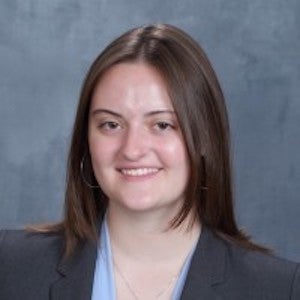Maggie Hill ’23 is studying Pharmaceutical Sciences and is part of URI’s Accelerated Bachelor’s to Master’s Program (ABM) program. Her area of focus is marine microbials and their potential usage in medicine. Learn how Maggie’s time in the Honors Program has helped her pursue interests outside her major, provided her with a variety of academic experiences, and how she plans to inspire college students in the future.
Tell us a little about yourself: Where are you from? What drew you to URI?
I’m from Monrovia, Maryland, and what initially drew me to the University of Rhode Island was the Marine Biology program. I had always grown up with a passion for learning about marine life, but I was more interested in the molecules they were using to communicate rather than the complex ecosystem in which they resided. During one of my first college tours, I met with my now Principal Investigator, Dr. David Rowley, who sparked my interest in the concept of “marine pharmacognosy”, a field of research that I had not yet been familiarized with at the time. He convinced me to switch my major to Pharmaceutical Sciences, so I could conduct research with him in the College of Pharmacy and investigate the complex nature of marine microbial interactions for the purpose of drug discovery. This was the perfect blend of my interests and I have thoroughly enjoyed my time here in the B.S.P.S program.
How have your Honors classes helped you integrate and “springboard” into the university and beyond? Please describe any impact it had on your experience so far at URI.
As a first-year student here, I was considered a sophomore after all of the credits I transferred in. My first few courses in the Honors Program were prerequisites for my major, such as Communications 100 Honors. These Honors classes helped me to reorient my learning to incorporate past and present knowledge and to always keep the larger picture in mind. I enjoyed the opportunity to participate in class discussions and to integrate and synthesize big ideas, especially because a large portion of my other courses were lecture halls with memorization being the main focus of the learning.
How has your Honors education helped you to think differently about topics within or outside of your major or other area of study? Has it introduced you to new concepts or ways of thinking? Has it changed the way you thought about an important issue? Please elaborate.
The Honors Program gave me the fortunate opportunity to pursue interests outside of my major. For example, I took an entry-level Gender and Women Studies course in my junior year, which really brought out the feminist in me. The curriculum allowed me to think critically and revealed the systemic issues of a healthcare system that I had previously only learned about in the context of a pharmaceutical sciences class. Honors courses not only allowed me an escape from my main pursuit of knowledge but also allowed me to make connections between multiple disciplines and become a more well-rounded individual in the process.
As you completed your Honors course(s), what are ways that you feel it helped prepare you for life after URI?
Varying levels of honors courses provided me with different experiences. Honors courses at the 100-level provided me with a different learning environment and allowed me to flourish in subject areas that I might not have initially. Courses at the 200/300-level brought me outside of my comfort area and prompted critical thinking. Lastly, 400-level/colloquium/honors project courses created a space for me to develop valuable skills, such as synthesizing interdisciplinary ideas and creating workflows to pursue such knowledge.
What are your short and long term plans post graduation?
My short-term plans post-graduation would be to finish up the Master’s portion of my ABM program, which will conclude sometime next Spring semester (2024). Following the completion of my Master’s, I will be pursuing a Ph.D. in either Microbiology, Chemical Biology, or Medicinal Chemistry & Pharmacognosy to continue my development as a scientific researcher. Thinking long-term, I would like to eventually see myself in academia, pursuing research questions of my own, working with undergraduate/graduate students in the laboratory, and teaching students in a (college) classroom setting to hopefully motivate them in the way that the University of Rhode Island did for me.

